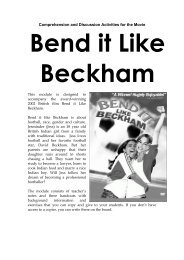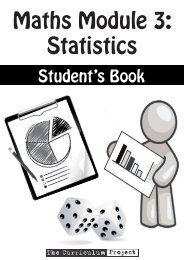Economic Systems (cont’d)On Your Own1. Ask differnet students to read aloud the different opinions, A, B & C. <strong>The</strong>n,give students 5 minutes to read them through on their own and makedecisions about which person is referring to which economic system. Answers:A: Mixed economyB: Free market economyC: Planned economyEconomic FreedomAsk students to read the text. Check understanding.DiscussionGroupwork2. Put students into groups of 3-5. Give them a few minutes to discuss thesequestions and write down their ideas. <strong>The</strong>n elicit one idea from each groupin turn and check agreement with the rest of the class.3. Put the students into groups of 3-5 people. Give them 10 minutes tobrainstorm ideas for the possible dangers of a completely free marketeconomy, and a completely planned economy.Elicit one suggestion from each group in turn, and see whether the othergroups agree. Write good suggestions on the board. Below are somesuggestions to help you to prompt the class (there are many more possibleideas to add).Possible dangers of a free market economy:• businesses are free to pay their workers very low wages;• businesses are free to operate unfairly in order to destroy competition;• businesses are free to exploit natural resources without limits in the search for profit;• providers of key services such as education, transport and healthcare are free toexclude people who cannot pay;Possible dangers of a planned economy:• If the government makes bad decisions, they can affect everyone seriously. In a freemarket economy, many businesses are making many different economic decisions, sorisk is spread widely.• A lack of free competition can lead to low quality products and services, very fewchoices, and inadequate supply.• <strong>The</strong> government has too much economic power over the people, and can easily abusethat power.• Demand is very difficult to predict accurately, so a planned economy is often veryinefficient, with many unnecessary goods and services produced. A free market, withmany different producers, is able to be much more flexible.• Competition is a way of keeping prices low. In a planned economy there is very littlecompetition.A key consideration for economic systems is the relationship betweeneconomics, freedom and rights.<strong>The</strong> <strong>Curriculum</strong> <strong>Project</strong> ECONOMICS: an introduction - Teacher’s <strong>Guide</strong>48
Economic Systems (cont’d)Wealth distribution and economic freedomPre-teach: to minimise (verb): to make as small as possible, controversial (adj): creates a lotof disagreement and argument.Ask students to read through the text about ‘Wealth distribution and economicfreedom’. <strong>The</strong>y should write down any words that they don’t know. Elicit thesewords in turn. Ask if they, or other students, can guess the meaning. If not, givethem a dictionary to look it up and tell the class, or tell them yourself. Also checkthat they understand the meaning of the paragraph.Pre-teach: sector (noun): a part of the economyDiscussion1. Prompt students with questions concerning the different resources and servicesin Burma. <strong>The</strong>re is some information below to help you.Although the private sector in Burma is growing, the majority of economic activity in the country is stillcontrolled by the military government. <strong>The</strong> private sector operates under the many restrictions, and mostsuccessful private companies have very close ties with the regime.Economic Policy: all economic policy decisions are made by the central government, with very little discussionwith / participation of other groups in society.Education: the formal education sector in Burma is very restricted. <strong>The</strong> government is the main provider offormal education in Burma, and all school materials are heavily censored, or function mainly as propagandain favour of the government. Furthermore, education in Burma is not free, despite government claims,meaning that many students cannot afford to attend school. <strong>The</strong>re are some private schools, but theircurriculum is heavily censored, and only the wealthy elite can afford to send their children to them.Natural Resources: the military, companies set up by the military, or conpanies very closely connected to themilitary, and ceasefire groups, sometimes in cooperation with foreign companies control access to themajority of natural resources.Production: the private sector is increasingly involved in production in Burma, but the government stillplays a major role, and only companies with close ties to the military government tend to be successful.Transport: private companies and the government supply transport services. However, many private transportcompanies usually have close ties with the government.Healthcare: the public healthcare system in Burma is very limited and, in most cases, patients must pay fortheir treatment. Informal healthcare and traditional medicine are also available to people, but usuallyrequire some payment. <strong>The</strong>re are some private hospitals but they are only available to wealthy people.Communications: the government has control over all communications networks - telephone (land andmobile), internet etc.... Some private companies do operate with the government in this sector, but underheavily restricted conditionsEnergy: energy generation is controlled by the government. Energy supply is very unreliable to many partsof Burma. Some private companies are involved in the construction of power plants, but the government isthe only energy supplier in the country.Agriculture: Burmese agriculture is dominated by small family farms. Farmers are required to sell a percentageof their harvest to the government at a fixed price. <strong>The</strong> rest of their harvest they are able to sell on the openmarket, and to choose the price themselves. However, the government does impose pricing restrictions on themarket from time to time.Groupwork2. Put the students into groups of 3-5. Check that they understand what theyneed to do. Give them 30 minutes or so to decide on their strategy, fill in thetable, and prepare their arguments. <strong>The</strong>n give each group 3-5 minutes to presenttheir ideas to the class. Make sure they give reasons for their decisions. Allowquestions after each presentation. Note: <strong>The</strong>re are no ‘right’ or ‘wrong’ answersin this exercise. This is about ideas and opinions.<strong>The</strong> <strong>Curriculum</strong> <strong>Project</strong> ECONOMICS: an introduction - Teacher’s <strong>Guide</strong>49


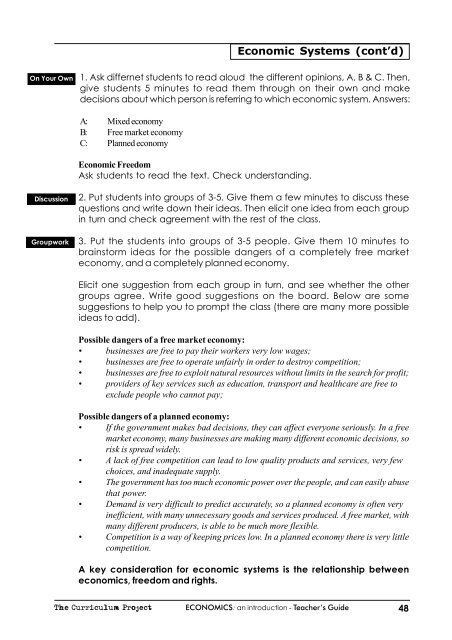
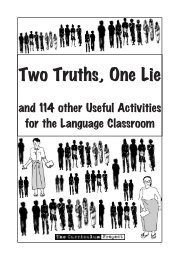
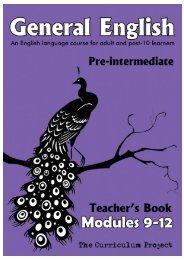

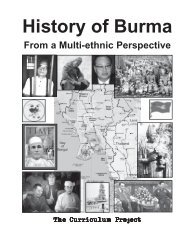
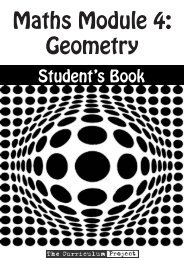



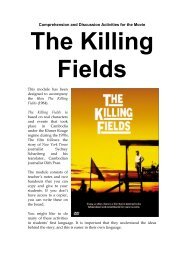
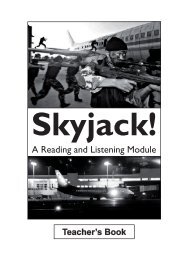
![[Eng] Nov 2012 DRAFT - The Curriculum Project](https://img.yumpu.com/45590859/1/184x260/eng-nov-2012-draft-the-curriculum-project.jpg?quality=85)
